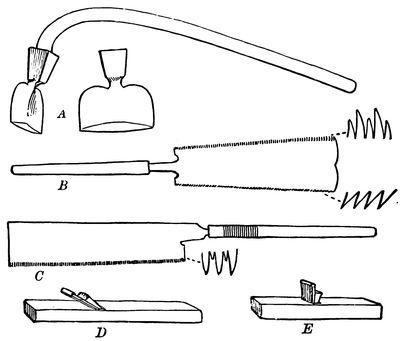Here is some advice from 1899 about building up your tool kit. It is as relevant now as it was then.
Suggestions about Buying.
Start With A Few
Do not start in by buying a chest of tools, certainly not one of the small cheap sets. They are not necessarily poor, but are very apt to be. Get a few tools at a time as you need them. In that way you will get all you need in the most satisfactory way.
Better Care
 Besides the fact that you can do good work with few tools there are various reasons which make it better to begin with but few. You will probably take better care of a few than of many. If you have thirty chisels on the rack before you and you make a nick in the end of the one you are using, there is a strong chance that instead of stopping to sharpen it you will lay it aside and take one of the remaining twenty-nine that will answer your purpose, and before you realise it have a whole rack full of dull tools. If you have but few chisels, you will be compelled to sharpen them, and so get into the habit of taking proper care of them—not to speak of the time which is often wasted in putting away one tool and selecting another unnecessarily.
Besides the fact that you can do good work with few tools there are various reasons which make it better to begin with but few. You will probably take better care of a few than of many. If you have thirty chisels on the rack before you and you make a nick in the end of the one you are using, there is a strong chance that instead of stopping to sharpen it you will lay it aside and take one of the remaining twenty-nine that will answer your purpose, and before you realise it have a whole rack full of dull tools. If you have but few chisels, you will be compelled to sharpen them, and so get into the habit of taking proper care of them—not to speak of the time which is often wasted in putting away one tool and selecting another unnecessarily.
Favorite Tools
The longer you work the more you will get to rely on a small number of tools only, however many you may have at hand for occasional use. After you have worked for some time you will be very likely to have your favourite tools, and find that certain tools do better work in your hands than certain others which perhaps someone else would use for the purpose, and you will naturally favour the use of those particular implements, which is another less important reason for not starting in with too great a variety. I do not mean that you will imagine you can do better with one tool than another, but that you really can do so. That is where individuality comes in—the “personal equation.”
Watch a skilful carver at a piece of ordinary work. See how few tools he spreads before him, and how much he does with the one in his hand before he lays it down for another. You would think it would take twenty-five tools, perhaps, to cut such a design, but the carver may have only about half a dozen before him. He gets right into the spirit of what he is doing, and somehow or other he does ever so many things with the tool in his hand in less time and carries out his idea better than if he kept breaking off to select others.
Confidence In Your Tools
This shows that confidence in the use of a tool goes a long way toward the execution of good work, which is one reason for learning to use a few tools well and making them serve for all the uses to which they can advantageously be put. In short, if you have but few tools at first you get the most you can out of each tool and in the way best for yourself.
Now I do not mean by all this that it is not a good thing to have a large kit of tools, or that you should not have the proper tools for the various operations, and use them. I mean that you should get your tools gradually as you find that you need them to do your work as it should be done, and not get a lot in advance of needing them just because they seem to be fine things to have, or because some carpenter has them in his chest.